The definitive issue-by-issue comic book collecting guide and trade reading order for the original run of Uncanny X-Men by Chris Claremont comic books in omnibus, hardcover, and trade paperback collections. Part of Crushing Krisis’s Crushing Comics. Last updated November 2024 with titles scheduled for release through July 2025.
![]()
Uncanny X-Men by Chris Claremont (1975 – 1991)
X-Men did not officially become Uncanny X-Men until issue #142. However, the cover featured the “Uncanny” adjective starting with #114. Ultimately, many fans and comics resources refer to the entire relaunch from issue #94 forward as Uncanny X-Men – a convention Marvel upholds with the titling of their Marvel Masterworks reprints.
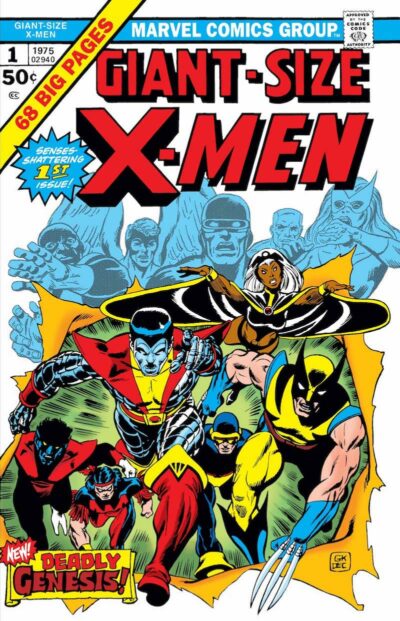 This 16-year period of X-Men by Chris Claremont is indisputable as the most classic era of X-Men, as well as generally considered to be one of the best runs of superhero comics of all time. The vast majority of thematic material later expressed in other forms of X-Men media including films, games, and toys originated in this run.
This 16-year period of X-Men by Chris Claremont is indisputable as the most classic era of X-Men, as well as generally considered to be one of the best runs of superhero comics of all time. The vast majority of thematic material later expressed in other forms of X-Men media including films, games, and toys originated in this run.
It all begins in 1975 with Len Wein and Dave Cockrum on Giant Size X-Men, which brought back Wolverine from a single appearance in Incredible Hulk and introduced a trio of characters that have become anchors of the franchise: Storm, Colossus, and Nightcrawler. It also brought Banshee and Sunfire back into the X-Men cast from their earlier Silver Age appearances, plus introduced Krakoa – the mutant island!
Chris Claremont took over writing duties from Len Wein just a few issues later. Under his pen, the trio of Wolverine, Storm, and Colossus would persist throughout a historic 16-year run that saw X-Men go from a marginal book returning from cancellation to the most-popular comic book franchise in America.
Along the way Claremont and a who’s who of artist collaborators steered the title through many signature foes and historic plots that have influenced movies, books, games, and toys for decades.
The first half of Uncanny X-Men by Chris Claremont – alongside Dave Cockrum, John Byrne, and John Romita Jr. – features a core of the classic Giant Size team, plus Kitty Pryde, under the leadership of Cyclops and Professor Xavier.
It included classic storylines like Proteus, The Dark Phoenix Saga, Days of Future Past, The Brood Saga, and God Loves Man Kills. Claremont and his collaborators introduced characters including Moira MacTaggert, Lilandra and the Shi’ar Empire, Arcade, Emma Frost and the Hellfire Club, Dazzler, Kitty Pryde, Rachel Summers, Callisto, Caliban, Forge, Selene, and many more – including importing Mystique and Deathbird from his run on Ms. Marvel! Plus, it saw him launch New Mutants and begin Magneto’s heroic turn.
The latter half of Chris Claremont’s landmark run on Uncanny X-Men – with Romita Jr., Marc Silvestri, & Jim Lee – begins with Storm usurping leadership of the team from Cyclops, who leaves the team for X-Factor. That means none of the original five X-Men star in this period of the book. Storm, Wolverine, and Colossus have seniority, and the team features some lesser-known characters such as Longshot, Dazzler, and original-body Psylocke, while introducing Mister Sinister, Jubilee, assassin-body Psylocke, and Gambit – plus, bringing back Sabretooth from his Bronze Age run on Iron Fist. And, it featured Magneto’s slide back to villainy.
That period bears a distinctly more dark and rebellious tone, with 21 issues passing with no X-Men team in existence! It also introduces the idea of both X-book and Marvel-wide crossovers with Mutant Massacre, Fall of the Mutants, Inferno, and X-Tinction Agenda.
This guide is not a complete reading order that follows the team through all of their various guest appearances! Instead, this guide focuses only on the issues of the Chris Claremont run and issues routinely collected alongside them. For a complete X-Men reading order for this period, start with The Definitive X-Men Reading Order: Second Genesis.
This is Marvel’s most-collected run of comic books, which is both a blessing and a source of great confusion. There are a few specific formats of books that cover large portions of this title, and I’ll cover those first – Essentials, Epics, Masterworks, and Omnibuses. Or, you can read the run in its entirety on Marvel Unlimited: Main Title, Annuals
- Marvel Masterworks: Premium-format color sequential collections
- Epic Collections: Trade paperback gapless collections released in random order
- Essentials: Affordable black & white sequential collections of the complete X-Men by Chris Claremont
- Omnibus & Oversize Hardcovers: Massive, collector-edition tomes with oversize pages:
Then, I’ll break down the run by five distinct periods of cast and storytelling, listing any smaller collections of the material.
- Giant Size & #94-142: The Rise & Fall of Phoenix, which also includes:
- back-ups from Classic X-Men (1986) #1-44
- #143-198 & Annual 5-9: The New Mutants, which also includes:
- Avengers (1963) Annual 10
- Special Edition X-Men (1982) #1 (Kitty & Illyana backup)
- Marvel Graphic Novel (1982) #5 [AKA God Loves, Man Kills]
- Wolverine (1982) #1-4
- Magik (1983) #1-4
- Kitty Pryde and Wolverine (1984) #1-6
- X-Men and Alpha Flight (1985) #1-2
- Nightcrawler (1985) #1-4
- New Mutants Special Edition (1985) #1
- #199-227 & Annual 10-11: Fall of the Mutants, which also includes
- Longshot (1985) #1-6
- New Mutants (1983) Annual 2
- Fantastic Four vs X-Men (1987) #1-4
- X-Men vs. Avengers (1987) #1-4
- Mephisto vs. (1987) #3 (X-Men)
- #228-264 & Annual 12-13: Through the Siege Perilous, which also includes
- X-Terminators (1988) #1-4
- X-Men: Spotlight On Starjammers (1990) #1-2
- #265-280 & Annual 14 and X-Men (1991) #1-3: X-Tinction & Reunification, which also includes
- Days of Future Present 1991 Annuals crossover in New Mutants, X-Factor, & Fantastic Four
- Kings of Pain 1992 Annuals crossover in New Mutants, X-Factor, and New Warriors
Patreons make this page possible! Every month, Patrons of Crushing Krisis help to fund its hosting, helper applications, video production, and more! Every dollar contributed by Patrons goes directly to helping sustain and grow this site.
Join the Crushing On Crushing Krisis mailing list for a notice whenever this page is updated with new collections – plus, a not-more-than-weekly ping about new comics content.
![]()
Uncanny X-Men by Chris Claremont in Standard Collected Edition Formats
X-Men by Chris Claremont in Marvel Masterworks
Marvel Masterworks editions are high quality, full color reproductions of original issues. The same print sequence of books is now being released as paperbacks through the end of 2014, at which point the paperback line ended. If you decide to buy hardcovers, the newest editions are 2003 or newer, with silver dustjackets.
For a boxed set collection with a similar form-factor to these Masterworks, check out X-Men: Children of the Atom Box Set, which collects Uncanny X-Men #1-143 in a series of hardcovers (though they do not line up exactly with the breaks in these books)
Click to expand a list of Masterworks volumes![]()
X-Men by Chris Claremont in Epic Collections
Marvel Epic collections give you quality reprints on a budget, featuring hundreds of pages of full color comics on matte paper stock. The series is being released out-of-order, so you never know which volume will come next!
Unlike X-Men Essentials and Masterworks, The X-Men Epic collections continue their numbering from the four volumes that cover the classic 1963 X-Men series – and onward into the next era!
Click to expand a list of Epic Collection volumesThis Epic Collection line continues into the next period, as covered by Guide to Uncanny X-Men – The Crossover Era.
![]()
X-Men by Chris Claremont in Essentials
Marvel Essentials are phone-book-sized collections of issues printed in black and white on thin paper. They’re a great way to read classic comics on a budget, and to experience the original pencils and inks of revered comic artists!
Click to expand a list of Essential volumes![]()
The Uncanny X-Men by Chris Claremont Omnibus Line
Omnibus editions are deluxe, oversized, hardcover reprints in full color with dust jackets. They’re the most high-end reprint offering from Marvel at the moment – although, they’re a little unwieldy to hold on your lap!
This sequential “Uncanny X-Men Omnibus” line follows the mapping of Marvel Masterworks volumes, collecting only the minimum amount of crossover issues required from other X-books and elsewhere in the Marvel line. One key difference between this line and the Line-Wide omnibuses in the next section is that it will not omit any of the late-80s event Annuals.
Click to expand a list of Omnibus volumes![]()
X-Men Line-Wide Omnibuses & Oversize Hardcovers
These omnibuses and oversize hardcovers offer comprehensive coverage of the X-Men line across multiple titles – covering key events and the issues that surround them as the books increasingly interconnected with each other.
Click to expand a list of linewide hardcovers.![]()
Omnibuses & Oversize Hardcovers by Author, Character, Storyline, or Event
These oversize books do not collect complete, sequential runs of comics. Instead, they collect issues selected based on author, character, or storyline – which may leave some gaps in your reading.
Click to expand the list of hardcovers specific to a single author, character, or storyline.![]()
X-Men by Chris Claremont by Single Issue or Storyline
Uncanny X-Men #94-142: The Rise & Fall of Phoenix (1975 – 1981)
New writer Chris Claremont began sowing the seeds of the Dark Phoenix story in issue #99, which would bear fruit as one of comic’s most classic storylines more than three years later! His period with penciler John Byrne and inker Terry Austin includes some of the most indelible X-Men stories and images, still referenced to this day.
This run has the core team of the surviving Giant Size quartet of Wolverine, Storm, Colossus, and Nightcrawler, plus Cyclops and Jean (as Phoenix). Moira McTaggert, Banshee, Dazzler, Kitty Pryde, and then-villain White Queen also make appearances.
Click to expand the list.![]()
Uncanny X-Men #143 – 198: The New Mutants (1981 – 1985)
This era of Uncanny X-Men was penned entirely by Chris Claremont, with significant runs from artists Dave Cockrum, Paul Smith, and John Romita, Jr.
In the period after the Dark Phoenix Saga, Cyclops as the only original X-Man left on the team. It adds Shadowcat and, later, Rogue (in issue #171) to the roster. Angel is a member briefly at the beginning of this era, while Forge and Rachel Summers begin to appear late in the run.
At this point X-Men was well-established and widely-read enough that it had been spun off to a single companion book written by Chris Claremont, New Mutants, as of issue #167. While the books had a tight continuity with each other, they only directly crossed over in Annuals – which means this era represents the end of being able to read Uncanny as a “standalone” X-Men series.
Click to expand the list.![]()
Uncanny X-Men #199 – 227: Fall of the Mutants
Begins in November 1985, concurrent with the release of New Mutants #33 and a few months prior to X-Factor #1 (the impetus for which is Storm’s defeat of Cyclops in issue #201).
In this sequence of issues the team loses Cyclops, acquires new members, endures the Mutant Massacre in the Morlock tunnels, and ultimately gets labeled as terrorists for blowing up a federal building. The team is anchored by Storm, Wolverine, Rogue, and Colossus, with the additions of Psylocke, Dazzler, and Longshot.
Click to expand the list.![]()
Uncanny X-Men #228-264: Through The Siege Perilous
Begins in April 1988, concurrent with New Mutants #62 and X-Factor #28. Excalibur #1 starts around issue #235, with Wolverine’s regular series beginning as of issue #237.
After being labeled as fugitives by the government the X-Men relocate to the Australian outback and are rendered invisible to electronic surveillance equipment.
The unraveling of the team continues until it is effectively disbanded by issue #251, leaving Wolverine crucified, Psylocke in a new body, Polaris possessed, and Storm completely MIA.
Issue #248 features the X-Men debut of Jim Lee, who would not only transform the way each character looked, but would also ultimately lead to the addition of the adjectiveless X-title and the departure of Chris Claremont.
Click to expand the list.![]()
Uncanny X-Men #265-280 & X-Men #1-3: X-Tinction & Reunification
Begins in November 1990 with the X-Tinction Agenda crossover, continuing in New Mutants #95 and X-Factor #60. Elsewhere, it is parallel to Excalibur #31 and Wolverine #33.
This final era of Claremont’s run begins with one of his last major acts of creation – the debut of Gambit, as he rescues an adolescent Storm from The Nanny. That’s followed by a pair of prohibitive classic single issues – #268, featuring a WWII team up of Captain America, Black Widow, and Wolverine, and #269, featuring the reappearance of Rogue as she fights for her life against the specter of her absorbed Carol Danvers personality.
The X-Tinction Agenda brings all of the X-characters back together in a single location along with their colleagues in New Mutants and X-Factor. It marks the first time that more than two X-books held a direct, sequential cross-over with each other where every issue was essential to the continuing story.
Some would argue this was the beginning of a dark, overly-commercialized age for comics in the 1990s.
On the plus side, the crossover effectively reformed the team in the short term with a remarkable cast of heavy-hitters like Storm, Gambit, Wolverine, and Psylocke. It also sets up a massive restructuring that would see the transformation of New Mutants to X-Force and the introduction of an all-new X-Factor – plus, the launch of the adjectiveless X-Men title in 1991.
This brief span marks the end of Chris Claremont’s unprecedented run on Uncanny X-Men (he stuck around for the first three issues of X-Men, Vol. 2). It’s some of Jim Lee’s most remarkable X-book art, including his 1991 reimaginings of everyone’s costumes that would carry through to many forms of 90s media.
Click to expand the list.![]()
Continue to The Guide to Uncanny X-Men #281-393 – The Crossover Era
![]()
Didn’t find what you were looking for?
Check Amazon for Marvel’s newest X-Men titles.
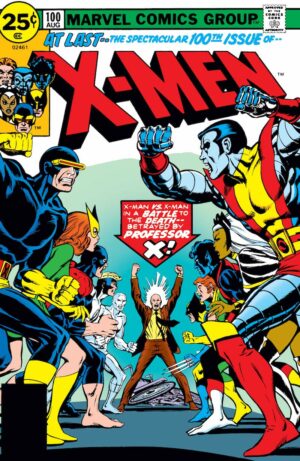 .
.
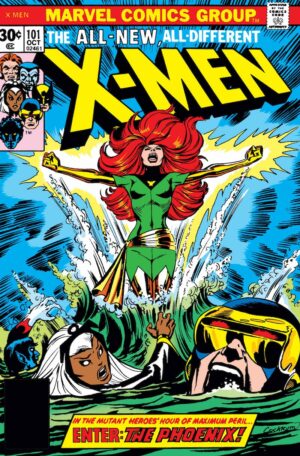
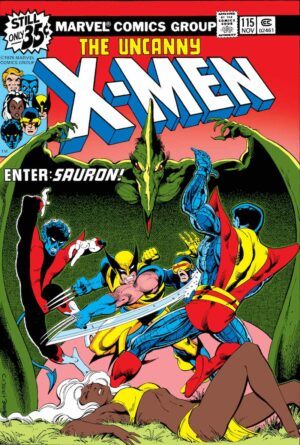
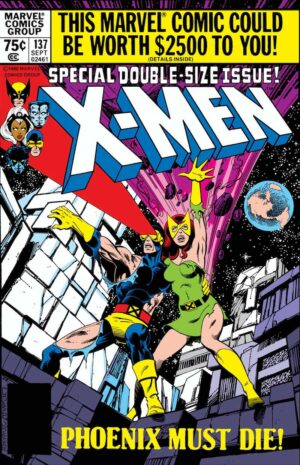
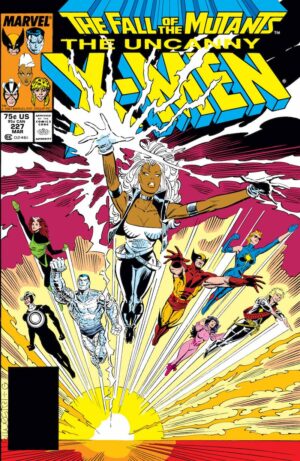
There is a new Mutant Massacre Omnibus which has the following:
COLLECTING: UNCANNY X-MEN (1981) #210-219; X-MEN ANNUAL (1970) #11; X-FACTOR (1986) #9-17, X-FACTOR ANNUAL #2; NEW MUTANTS (1983) #46; THOR (1966) #373-374, #377-378; POWER PACK (1984) #27; DAREDEVIL (1964) #238; FANTASTIC FOUR VS. THE X-MEN #1-4; X-MEN VS. THE AVENGERS #1-4
That should probably replace your current suggestion
Thanks for dutifully flagging this several years ago, Grant. This page is finally updated through present day!
Psst, you have a potentially confusing typo in the 2nd paragraph of your summary at the top of the page: “It also brought Banshee and Sunspot back into the X-Men cast from their earlier Silver Age appearances, plus introduced Krakoa”… I was able to figure out that you meant “Sunfire” and not Sunspot but maybe it should be fixed.
Thanks so much for all the work you do on these reading guides! I’ve been using this page to help me take the plunge into X-Men comics and it’s been very helpful!
Thanks, Ellie! It’s too easy to just let my fingers do the talking and type “Spot” instead of “Fire.”
What’s the best way to collect #199-264 since those Epic Collections haven’t been printed? Any idea why this era is largely being ignored (apart from the FALL OF THE MUTANTS and INFERNO-related trades)?